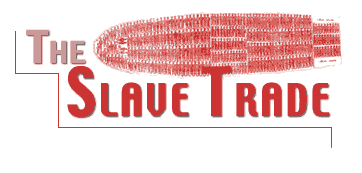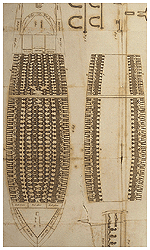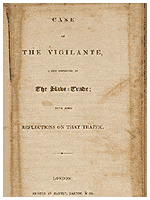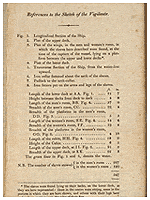 | 
 |
In discussions of the Atlantic slave trade, the term "Middle Passage" often arises. The Middle Passage was the route of sea going journeys of Africans taken from their Native land, to the shores of the Caribbean and America, where they were invariably destined to an existence of institutional slavery. The journey was one of the most horrific aspects of the morally deplorable system of slavery. One cannot, of course, mention the Middle Passage without eliciting the horrors of tightly packed men, women and children chained together, to keep them from rebelling, or from chosing the suicidal fate of jumping overboard. Death was a constant threat as disease, murder, starvation, suicide, asphyxiation and severe depression rampantly claimed the lives of both African slaves and white crewman. The portrait painted of the Middle Passage relies on a myriad of published documents, including abolitionist publications, as well as accounts of the journey written by vessel crewmembers and Africans transported as slaves, such as Olaudah Equiano.
 No contemporary argument regarding the Middle Passage can deny its horrific immorality. The simple fact of humans being stolen from their homeland and transported as cargo to the slave markets of the New World defies any concept of moral acceptability. To illustrate the inhumanity of the Middle Passage journey, it would seem only logical to appeal to the account of one who suffered through such a profound ordeal. Olaudah Equiano, kidnapped as a boy from his homeland in what is today Nigeria, recalls in his memoir, "I was immediately handled and tossed up to see if I were sound by some of the crew; and I was now persuaded that I had gotten into a world of bad spirits, and that they were going to kill me." He goes on to illustrate the journey: "The closeness of the place, and the heat of the climate, added to the number in the ship, which was to crowded that each had scarcely room to turn himself, almost suffocated us." The result of the overcrowding was that, "The shrieks of the women, and the groans of the dying, rendered the whole a scene of horror almost inconceivable." Other observers attest to this as well, exclaiming, "They [Africans] are often heard, on such occasions, to cry out in their own language, "We are dying, we are dying." No contemporary argument regarding the Middle Passage can deny its horrific immorality. The simple fact of humans being stolen from their homeland and transported as cargo to the slave markets of the New World defies any concept of moral acceptability. To illustrate the inhumanity of the Middle Passage journey, it would seem only logical to appeal to the account of one who suffered through such a profound ordeal. Olaudah Equiano, kidnapped as a boy from his homeland in what is today Nigeria, recalls in his memoir, "I was immediately handled and tossed up to see if I were sound by some of the crew; and I was now persuaded that I had gotten into a world of bad spirits, and that they were going to kill me." He goes on to illustrate the journey: "The closeness of the place, and the heat of the climate, added to the number in the ship, which was to crowded that each had scarcely room to turn himself, almost suffocated us." The result of the overcrowding was that, "The shrieks of the women, and the groans of the dying, rendered the whole a scene of horror almost inconceivable." Other observers attest to this as well, exclaiming, "They [Africans] are often heard, on such occasions, to cry out in their own language, "We are dying, we are dying."
A recurring theme throughout many accounts of the Middle Passage reflects on the slaves’ feelings of melancholy and despair. A European abolitionist pamphlet reads, "Picture to thyself a scene in which, in this narrow space, one is bemoaning the loss of his nearest connexions in life, and brooding, in melancholy sadness, over the cruelties and sufferings under which he is to spend the remainder of his days." Another abolitionist pamphlet cites, "The different witnesses examined by the English Parliament all agree, that when they [Africans] are put on board the vessels, they appear melancholy and dejected…on account of the separation from their country, their families, and their friends." Equiano, too, expressed feelings of "dejection and sorrow" as well as despair." While abolitionists maintained that the slaves’ melancholy and despair arose from their impending fate, as well as the dislocation and violence inflicted by the trade, there lies another side to the issue. Isaac Wilson, a surgeon upon the slave vessel Elizabeth, observed that ‘"a gloomy pensiveness seemed to overcast their countenances and continued in a great many."’ He goes on further to observe that those who had the melancholy could not be cured, and as a result died. Wilson concluded that "Melancholy was the remote cause of dysentery." Wilson may have been close to a correct deduction. It is plausible to deduce that those who exhibited prolonged and incurable melancholy had already fallen victim to dysentery and its psychological effects. Of the 155 casualties aboard the 18th century British slave ship Elizabeth, 2/3 perished as a result of "melancholy" and its conceivable cause, dysentery.
 While the sufferings endured by the Africans of the Middle Passage are well known today, one must realize that in the context of 18th century Europe, these moral indignities remained virtually unnoticed. Slavery in the Caribbean was the loudly clanking skeleton in "civilized" Europe’s closet. Countries such as England and France benefited from the morally destitute system that lie hidden under the blanket of domestic civility. Until the anti slavery publications released in the late 18th century by the Society of Friends, Europe remained primarily ignorant and unaware of what their economic system entailed. Its citizens were not told of the chains, shackles, whips and guns, or perhaps simply did not care to know. They blinded themselves against the despair, disease, suffocation and suicide. Europe seemed to have been suffering from the Ostrich Syndrome, believing that "if you don’t see it, it isn’t there." But as Quakers began to appeal to the better angels of their religious doctrine, and accounts such as Equiano’s were published, Europe was given vivid imagery, exposing the reality of slavery. While the sufferings endured by the Africans of the Middle Passage are well known today, one must realize that in the context of 18th century Europe, these moral indignities remained virtually unnoticed. Slavery in the Caribbean was the loudly clanking skeleton in "civilized" Europe’s closet. Countries such as England and France benefited from the morally destitute system that lie hidden under the blanket of domestic civility. Until the anti slavery publications released in the late 18th century by the Society of Friends, Europe remained primarily ignorant and unaware of what their economic system entailed. Its citizens were not told of the chains, shackles, whips and guns, or perhaps simply did not care to know. They blinded themselves against the despair, disease, suffocation and suicide. Europe seemed to have been suffering from the Ostrich Syndrome, believing that "if you don’t see it, it isn’t there." But as Quakers began to appeal to the better angels of their religious doctrine, and accounts such as Equiano’s were published, Europe was given vivid imagery, exposing the reality of slavery.
In 1808, England abolished the slave trade. A major cause for British abolition was the exposure of the horrific Middle Passage journey. Mass publications depicted the close packing of a slave vessel as well as first hand accounts of its depraved brutality. After taking the step to admit and correct a moral atrocity, England introduced her testimony to the rest of chattel trading Europe. A report of the Yearly Committee of England’s Society of Friends cites:
The Committee hope that, when these pamphlets are published, they may be able to print cheap editions, or extracts from them, for their own circulation on the continent, through such channels as may appear proper and safe, but the existing restrictions on the press in France, render it difficult widely to disseminate, in that country, any accounts of the present state of the slave trade.
 England, possessing the world’s most powerful navy, began to exert her seafaring muscle by patrolling Europe’s oceans, as well as by educating its citizens as to the reality of their economic structure. By setting the precedent, it became easy for Britain to showcase their morality through naval intervention and graphic illustration of their now foreign practice. The committee report expounds on this point saying: England, possessing the world’s most powerful navy, began to exert her seafaring muscle by patrolling Europe’s oceans, as well as by educating its citizens as to the reality of their economic structure. By setting the precedent, it became easy for Britain to showcase their morality through naval intervention and graphic illustration of their now foreign practice. The committee report expounds on this point saying:
"A Sub Committee of the African Institution is now publishing an abstract from the papers lately laid upon the table of the House of Commons, which develop great enormities still practiced in Africa and upon the persons of its inhabitants, by the subjects of different European Powers."
The abstracts aimed to show Europe, "the present circumstances of this ubiquitous trade."
The present circumstances of the time were, of course, disheartening. Human beings were torn from their homeland and packed into a strange vessel, destined for a nightmarish existence. The grueling journey, often consisting of slaves thrown overboard, slaves resisting by jumping overboard, whipping, suffocation, overpowering despair and disease, was symbolically and physically representative of African slavery as a whole as well as the foundations of Europe’s global power. It was no wonder that the accounts of the Middle Passage were the primary sources used for the abolition of the slave trade. With voices such as Equiano’s, European society was exposed to an individual tale of suffering, which in turn enabled practitioners and citizens to realize that each slave possessed their own tale of misery. It was the horror of the Middle Passage, and its depicted accounts, which toppled the first domino of European abolition to the slave trade. The brutality, of which the slave trade was born, ultimately led to its death.
|
Rawley, James A, The Transatlantic Slave Trade, New York: W.W. Norton & Co., 1981
Equiano, Olaudah, The Interesting Narrative of the Life of Olaudah Equiano, or Gustavus Vassa, the African, London: 1789 (reprinted Coral Gables:1989)
Clarkson, Thomas, The Cries of Africa to the Inhabitants of Europe or a Survey of that Bloody Commerce Called the Slave Trade, London: Harvey Dart & Co. 1822.
Case of the Vigilante, a Ship Employed in the Slave Trade; with Some Reflections on that Traffic, London: Harvey Darton &Co. 1823. |

 |





